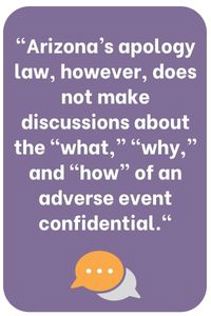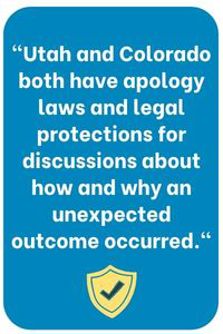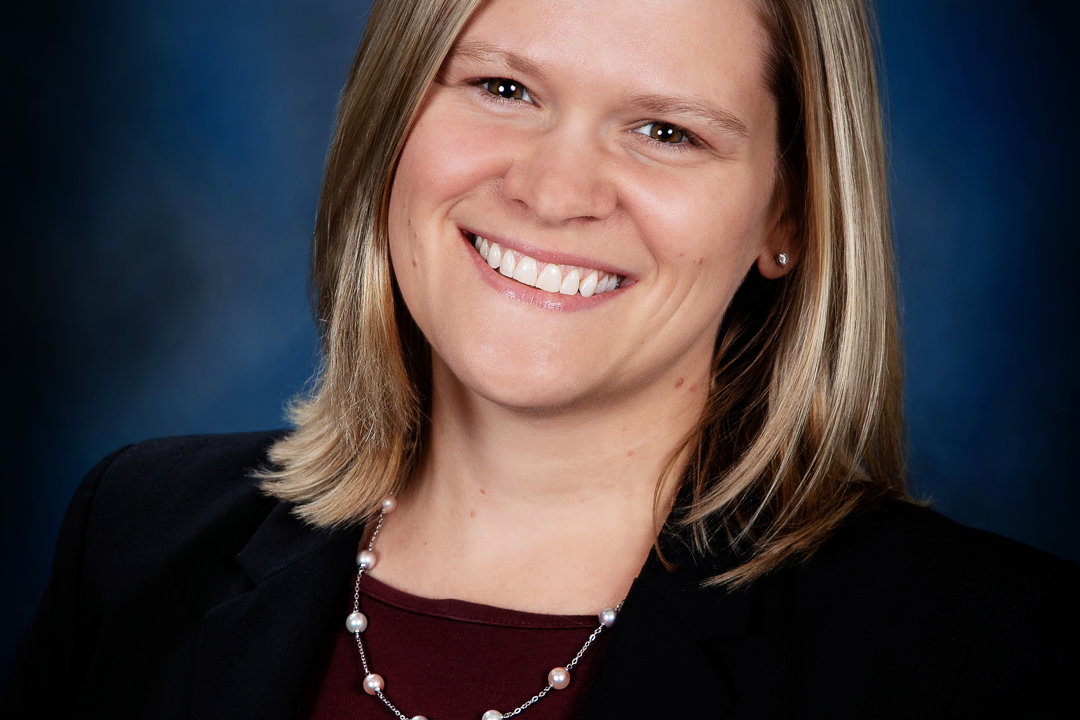
- Patients
What You Need to Know About Your State’s Apology Law in the Southwest
Having a sincere discussion with a patient after an adverse event can be important while also knowing what will be confidential under your state's Apology Law.
When addressing unexpected medical outcomes with patients and their families, it is important to understand your state’s apology law and other potential legal protections afforded to discussions surrounding the outcomes of medical care. Health care organizations may also have their own disclosure and early resolution programs of which you should be aware.
The following summaries of applicable MICA member-state laws, programs, and policies and procedures can help you navigate these sensitive discussions.
MICA Members: Report all claims, occurrences, and lawsuits, including events related to CANDOR or other early resolution program, as quickly as possible by calling the MICA Claim department Monday through Friday 8:30am-5pm MST at 800-352-0402 or 602-956-5276.
What Does Apology Law Allow for in Arizona?
Patients may be emotional and full of questions upon learning of an adverse event or unexpected outcome of medical care. Practitioners should avoid appearing evasive and approach the patient and their family with sincerity, honesty, and compassion.1
In 2005, Arizona passed a law affording protection to practitioners’ statements of apology.2 Confidentiality applies to “any statement, affirmation, gesture or conduct expressing apology, responsibility, liability, sympathy, commiseration, condolence, compassion or a general sense of benevolence that was made by a health care provider or an employee of a health care provider.” Such expressions of apology cannot be introduced as evidence of fault in a potential medical malpractice action.3

Arizona’s apology law, however, does not make discussions about the “what,” “why,” and “how” of an adverse event confidential. When answering questions about why the outcome occurred, it is important to be factual and avoid speculation. It is okay to tell the patient you will complete an investigation to understand the root cause of an unexpected outcome in an effort to avoid similar outcomes in the future. The key is to be honest without providing an opinion on things you may need time to sort out.
What Does Apology Law Allow for in Nevada?
Nevada does not have an apology law protecting expressions of apology from disclosure during a lawsuit4, or a law to protect discussions about the circumstances surrounding an adverse event.
It may be appropriate to acknowledge pain, loss, or grief with sincerity and empathy, but avoid statements of fault and refrain from speculation about what occurred. Stick to the facts as you know them at the time. Keep in mind that an investigation may reveal the root cause of an adverse event to be different than initial impressions so offering opinions or assumptions about what happened may be harmful if the patient pursues legal or licensing board action.
What Does Apology Law Allow for in Utah and Colorado?

Utah and Colorado both have apology laws5 and also legal protections for discussions about how and why an unexpected outcome occurred. Colorado’s apology law protects expressions of “apology, fault, sympathy, commiseration, condolence, compassion, or a general sense of benevolence” from being used against the practitioner in a lawsuit.
Utah’s apology law protects expressions of “apology, sympathy, commiseration, condolence, compassion, or a general sense of benevolence” from being used as evidence of fault in a medical malpractice lawsuit. Utah’s law also specifically protects practitioners’ descriptions of the facts surrounding the unexpected outcome from being used against them.
Utah and Colorado also have CANDOR (“communication and optimal resolution”) laws on the books. If a practitioner chooses to participate in a formal Candor investigation as described below, there is broader legal protection for discussions about adverse events and unexpected outcomes should an impacted party pursue civil action.
The CANDOR acts in both Utah and Colorado establish a voluntary process by which practitioners can engage adversely impacted patients or other interested parties in an investigation of the adverse event, and communicate information gathered during the investigation to the patient or other interested parties. The goal is to resolve potential conflicts that may lead to legal action soon after the unexpected outcome is known.
If the situation warrants, both states’ CANDOR acts include provisions for offering compensation and disclosing steps that will be taken to avoid similar outcomes in the future. Under the MICA Medical Professional Liability insurance policy, MICA members must report all occurrences, claims, and lawsuits to the MICA Claim department as soon they become aware them. MICA members should not wait for the patient to send a written demand for compensation or to file a lawsuit before reporting an occurrence to the Claim department. MICA members must not offer compensation or voluntarily make any payment before talking to the Claim department.
If early resolution is not possible by way of a CANDOR act investigation, patients still have a right to file a lawsuit or board complaint. However, the CANDOR act shields the information exchanged as part of an official CANDOR investigation from disclosure if the unexpected outcome becomes the subject of litigation.
Things to Keep in Mind When Affiliated With a Hospital or Health Care Facility
Arizona, Colorado, Nevada, and Utah: Usually, hospitals and health care facilities require employees and medical staff members to follow their disclosure-and-apology policy and procedure, the goal of which is to promote early resolution of incidents outside of litigation and promote patient safety. A copy of the policy and procedure should be available to employees and medical staff members.
Don’t wait until an adverse or unexpected outcome occurs to read the organization’s policy and procedure for disclosures, apologies, and early resolution program requirements -- read the policy and procedure now.
Before meeting with the patient and/or family, consider how to comply with the organization’s policy and procedure; limit the discussion to the known facts; and express empathy, concern, and your availability for future questions. The organization’s process may offer further protection in the event of a lawsuit.
MICA Members: Report all claims, occurrences, and lawsuits, including events related to CANDOR or other early resolution program, as quickly as possible by calling the MICA Claim department Monday through Friday 8:30am-5pm MST at 800-352-0402 or 602-956-5276.
1 The Arizona Medical Board has found a lack of candor in such situations to be an aggravating factor in determining appropriate disciplinary action for a physician who was not forthright with a patient after an unexpected post-surgery complication.
2 For more information on apology and disclosure in Arizona, see Disclosure of Adverse Events by Paul Giancola, published in MICA’s Risk Advisor, p. 15 (June 2019).
3 The Arizona Court of Appeals upheld the constitutionality of this law in a 2021 decision. To read more, please see Arizona’s “I’m Sorry” Law Survives Constitutional Challenge by Paul Giancola and Claudia Stedman.
4 For more information on apology and disclosure in Nevada, see Disclosure of Adverse Events by Brent Vogel, published in MICA’s Risk Advisor, p.18 (June 2019).
5 For more information on apology and disclosure in Utah, see Disclosure of Adverse Events by Jaryl Rencher, published in MICA’s Risk Advisor, p.16 (June 2019).

